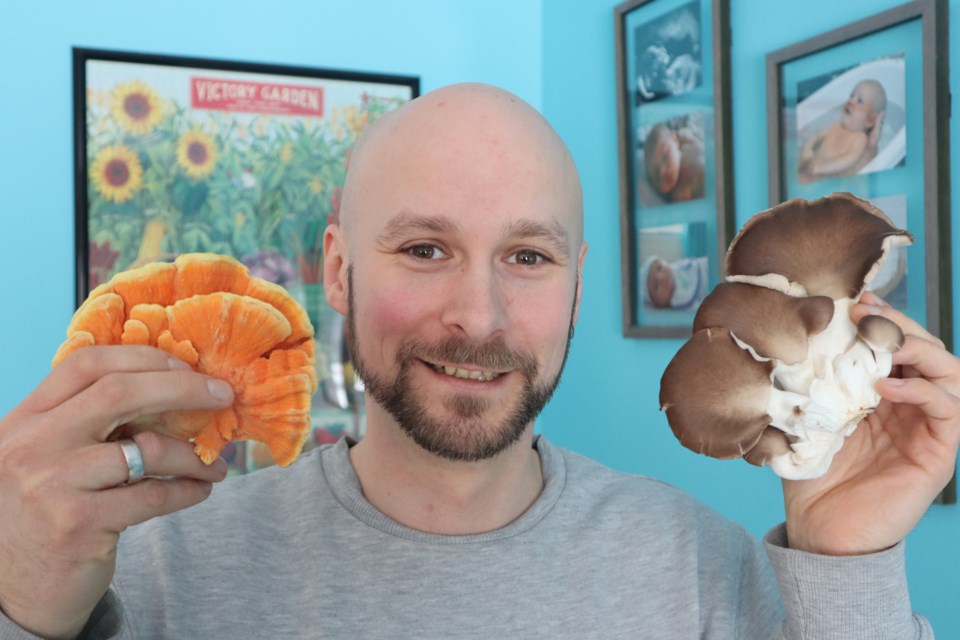Mushrooms are part of most meals at Tim Poeppel’s house and he wants to bring his same excitement for fungi to people in Guelph with his indoor farmed mushrooms.
It started as an experiment when Poeppel’s father-in-law had a log he was going to discard. Poeppel took it and tried to grow mushrooms from it but wasn’t successful because the wood dried out.
He didn’t give up. Once he began growing successfully, he started his business Tato's Mushrooms to bring unique mushrooms to people's tables.
YouTube videos from mushroom farmers across the world helped him see the types of indoor set ups there are for farming.
A background in chemistry helped him maintain lab cleanliness and understand the biology of mushrooms. He met his wife Irena Nikoloska at a chemistry internship in his home country, Germany. She went back to Canada and they kept in contact. When he finished his masters degree he moved to Guelph in 2016 to be with her.
There wasn’t much work in his field here so he worked in the automotive industry. When he was on parental leave with his second child, Veronika, he decided to go full force growing mushrooms.
Tato’s Mushrooms started in 2022 and he sold his first batch of mushrooms at the Guelph Farmers’ Market.
The name comes from the Macedonian word for dad, tato. Nikoloska is Macedonian and at home her children speak three languages; English, Macedonian and German. She speaks to them in Macedonian and Poeppel speaks to them in German. Since Nikoloska would refer to him as tato, instead of papa in German, they would call out for tato.
For children, it’s easy to hide mushrooms in food. When Poeppel makes meatballs he adds shredded sauteed mushrooms to the blend.
He grew up with a vegetable garden and continued growing with his own garden. Having a mushroom farm in his basement was a whole other beast. Humidity and temperature control are key. Monitoring for contamination and picking the mushrooms when they are ready means Poeppel can't take a vacation for longer than a night or two.
There are spores all around us and in the air we breathe. “Since mushrooms and fungi were there before us. We learned to live with them. But the spore load in a grow room or in a growing environment is significantly higher,” said Poeppel. He wears a heavy duty mask while tending to the mushrooms.
When the process starts from scratch it begins with mycelium which is a fungus in a liquid culture, then it grows in a grain and finally transferred to block of substrate that feeds it. A cluster of mushroom emerges.
The variety of mushrooms grown at the farm are lion’s mane, shiitake, chestnut, black popular and at least six types of oyster mushrooms. Chicken of the woods mushrooms haven’t made it to the list yet but taste similar to chicken.
Poeppel’s in the process of moving over his farm to another basement with more space. It should allow for larger production and will have a separate lab area. He still sells at the Guelph Farmers’ Market and has recently expanded by selling online.
The most frequently asked questions he gets is how to cook the mushrooms and what to cook them with. Since grocery stores carry button and shiitake mushrooms, people aren’t familiar with something as fluffy looking as a lion’s mane mushroom. Most are like any other mushroom and can be put into a stir fry, risotto or stand alone as a side dish. Others have a meatier texture and can be a substitute for people who don’t eat meat.
“And I find, especially for mushrooms, it's nice to have it as local as possible,” said Poeppel. He said it adds value when it only has to travel a short distance.
In the spring he is going to test the waters with wholesale to sell to local retailers and restaurants. Down the line he wants to have his farm in a commercial space and have employees who are also passionate about mushrooms.



